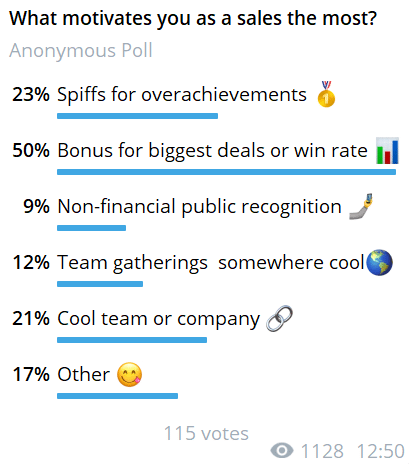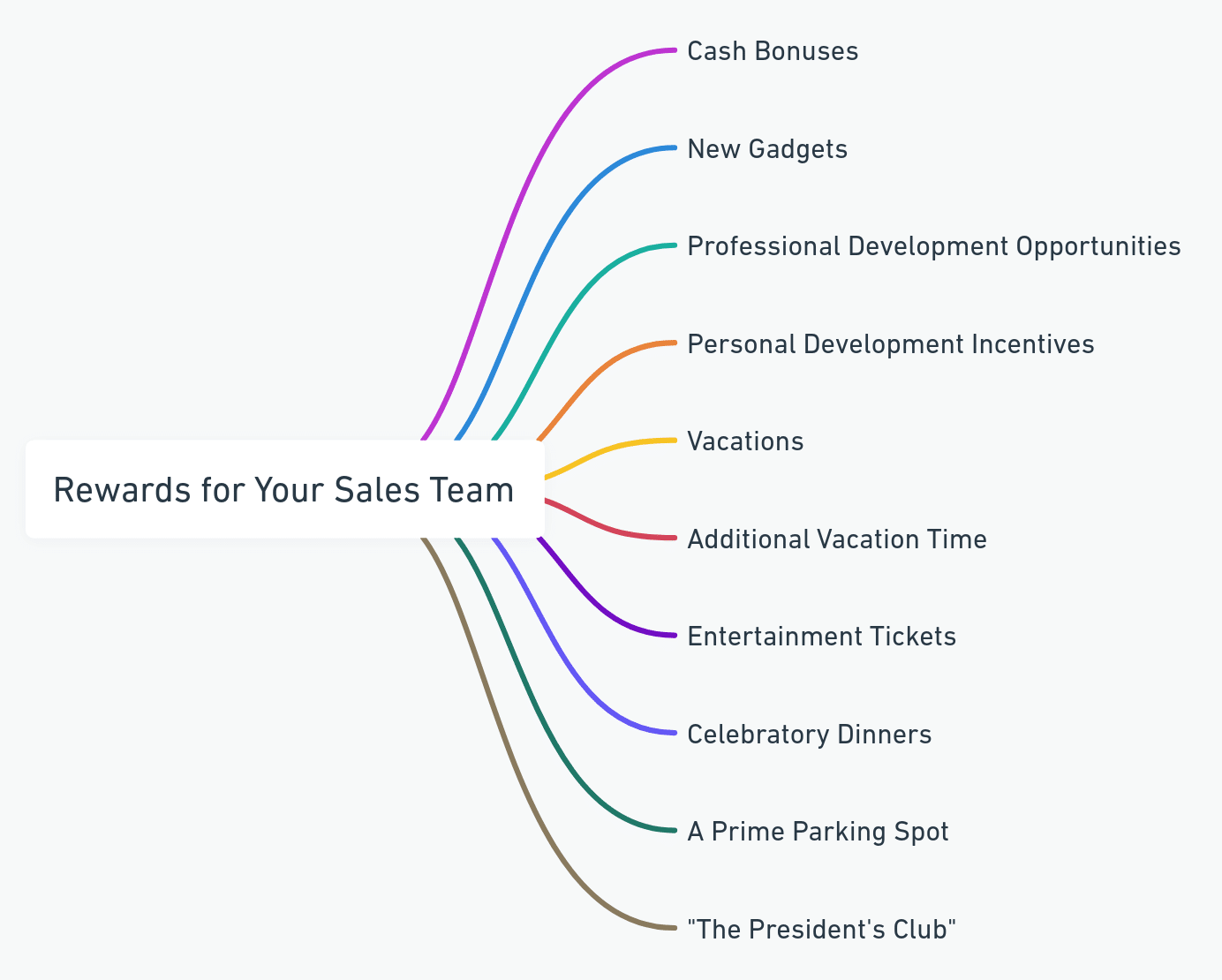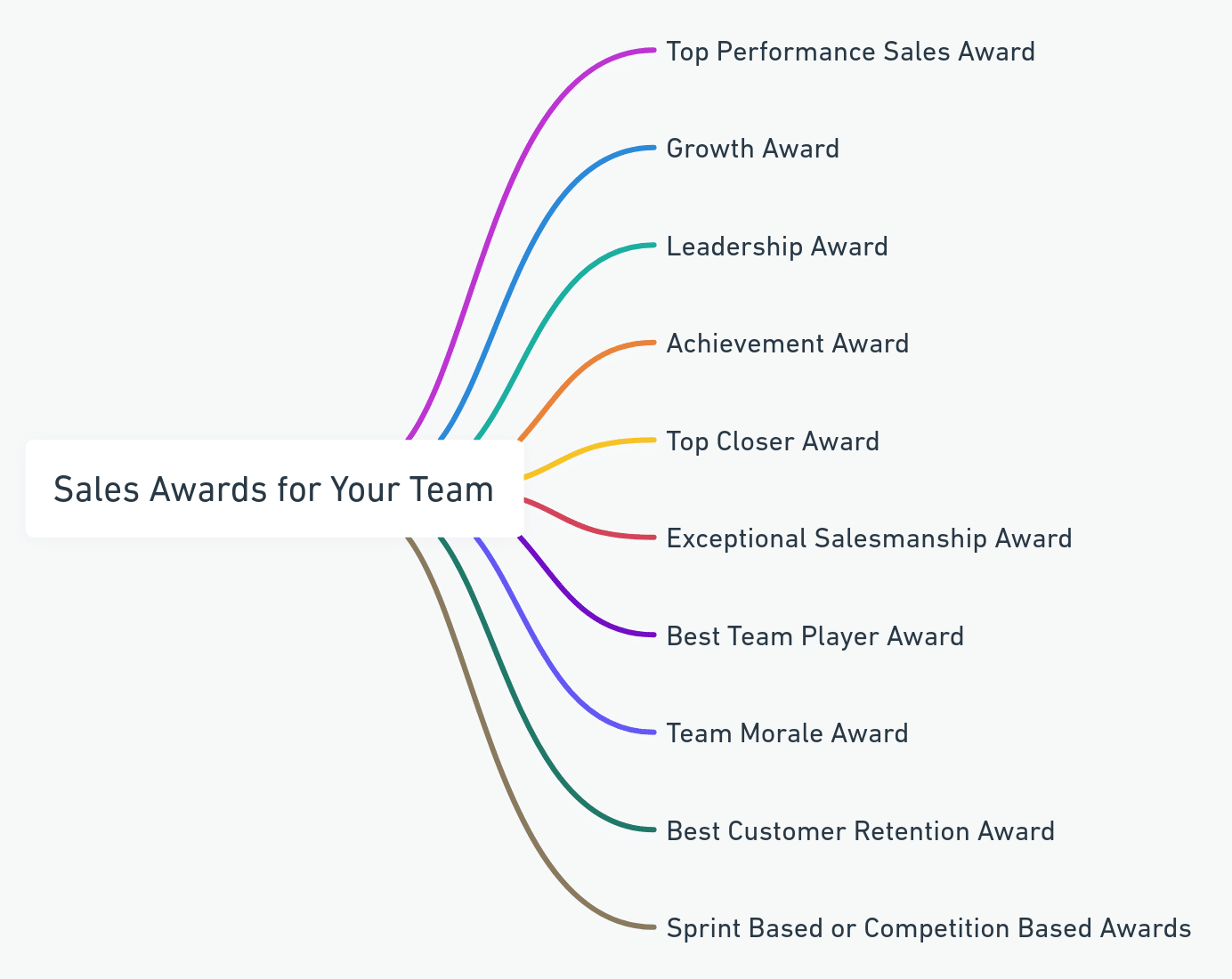12 Proven Strategies On How To Motivate Your Sales Team And Boost Performance

Sales isn’t easy.
It’s far too common to see sales teams demotivated.
There could be many reasons for that: difficult prospects, management decisions, compensation structure…
You have to get used to hearing ‘no’ if you want to succeed in sales.
But that’s not what we’re about to get into today.
When faced with that problem, the answer for many companies is to throw money at the problem and use that as an incentive.
“If you hit certain sales target, you’ll make more money.”
Simple enough, right?
You’d think. But according to new research by Harvard Business School, more than 80% of US employees say they don’t feel recognized or rewarded. Despite US companies spending a fifth of their budget on wages.
What really matters in the workplace is helping employees feel appreciated.
This applies especially to sales teams.
That said, what do you do if sales are down in your company?
Instead of promising exotic trips, sales contests, or rethinking your sales compensation plan, consider the 15 proven strategies we’re about to cover on how to motivate a sales team when sales are down.
Here’s what we’ll cover:
- How does sales team motivation work?
- What motivates sales teams across different businesses? 7 Unique factors to consider.
- 12 Proven strategies to implement within your business and motivate your sales team now.
What Is Sales Team Motivation And How Does It Work?
If we start talking about how motivation works in a general sense, this article will become too philosophical.
Instead, let’s take a practical, hands-on approach as far as sales teams are involved.
Essentially, emotional well-being of your sales team is key to success.
But everyone is motivated by different things. So, it’s extremely important to understand your team at the core.
Motivating your sales team means understanding the whys and motivations behind each team member.
So, before we cover practically how to motivate sales teams without money, let’s first cover the factors that affect sales team motivation, in terms of general company culture and benefits.
- Emotional well-being: The emotional state of your sales team plays a critical role in their overall performance. When sales teams feel valued, supported, and confident, they’re more likely to be motivated and productive.
- Individual motivation: Every salesperson is unique, with their own personal and professional drivers. So, catering to everyone is going to be almost impossible. Some may be motivated by financial awards, while others care about career advancement, recognition, or the ability to learn new skills.
- Clear and achievable goals: Clear and achievable goals should provide sales teams with a sense of direction and purpose. When teams know what they’re working towards, they can make their efforts more effective. Break down larger goals into smaller, manageable tasks to make progress more tangible. And let your sales teams know what they’re working towards in terms of your strategy and outcomes.
- Continuous Training and Development: This should be part of your company culture in general, not just for sales teams. Training helps keep your teams updated with the latest marketing trends, sales closing techniques, and product knowledge. In addition to that, this shows you care and that they’re valued in your company.
Another thing to consider is that no sales team is made entirely of stars.
Sales teams usually consist of 3 groups: solid performers, with smaller groups of laggards and rainmakers.
And as you might have guessed, each of these three groups is motivated by different things.
- Core performers typically represent the greatest opportunity, but they’re ignored by incentive plans. Instead, contests with prizes that vary in nature and value will inspire them to boost their efforts, and tiered targets will guide them up the performance curve.
- Laggards nerd quarterly bonuses to inspire them and stay on track. This group is motivated by social pressure. If they have quarterly bonuses to stay on track, their revenues might drop.
- Finally, stars (rainmakers) tend to get the most attention in comp plans, but companies often go astray capping their commissions to control sales costs. If you remove commission ceilings for your top salespeople and pay extra for overachievement, you’ll see the sales needle skyrocket.
The key is to treat sales compensation not as an expense, but as a portfolio of investments to manage.
Now, let’s take more of a hands-on approach and look at what actually motivates sales teams.
What Motivates Sales Teams? 7 Factors To Consider
As mentioned above, people are unique and what motivates them is unique as well.
But when you’re creating a sales team structure, there are certain factors that drive sales teams directly.
Let’s take a look at some of them now.
First off, according to our anonymous LinkedIn poll with 110+ votes, what motivates sales teams the most are as follows:
- 50% – Bonus for biggest deals or win rates.
- 23% – Spiffs for overachievements.
- 21% – Cool team or company.
- 17% – Other.
- 12% – Team gatherings.
- 9% – Non-financial public recognition.

Let’s take a look at what are some of those other factors that motivate sales teams, before covering 15 proven strategies you can implement in your company today.
Money incentive
Although a significant percentage of employees express that money isn’t the only motivator, it remains an undeniable force in sales motivation.
It’s important, however, to structure financial rewards in a way that motivates sustainability without leading to unhealthy competition, burnout, or unrealistic targets.
Non-financial rewards
Not every sales team is motivated by financial gain.
So, non-financial rewards can be equally effective.
This can include things like public acknowledgment of achievements, career advancement opportunities, personal development programs, and more.
Creating a supportive environment
A supporting environment and company culture are crucial for motivation.
This includes having managers who are genuinely interested in the well-being and success of their sales members.
Regular feedback and encouragement can boost morale and drive performance, if you’re wondering how to motivate sales teams without money.
Flexibility and autonomy
Offering salespeople more control over how they work can lead to increased job satisfaction and motivation.
This could mean flexible working hours or the option to work from home.
If they do have to work from the office, consider what you can do to make their stay more accommodating and enjoyable.
Continuous training and development
Ongoing training not only allows your sales teams to stay up-to-date with the latest industry trends and appointment setting services, but also shows that you are directly investing in their growth.
This can help grow employee engagement and loyalty to the company.
Team building activities
Team building helps build a sense of community and belonging among team members.
These can be simple outings or team-building exercises that are both fun and also cater to professional development.
You can also bring members who work together closer, which also makes it more fun for them and boosts overall sales productivity.
Involving the sales team in decision-making
If your sales team is working without a clear strategy or goal, chances are, they’re not as invested.
If you involve them in the decision-making and strategy processes, you’re directly giving them a stake in the company, allowing their motivation to contribute positively.
Involving them in decision-making processes can foster a sense of ownership and alignment with the company’s goals.
Your sales team’s emotions affect their performance.
So, before you start implementing the latest, proven strategies, make sure you first have a culture that inspires your reps that makes them enjoy coming to work.
If sales motivation is low, improving the culture is the first step to start.
Then, you can look into implementing practical strategies to motivate sales teams.

12 Proven Strategies To Motivate Your Sales Teams And Crush Quotas
Improving your team’s skill set is largely an objective process.
But with motivation, there are many external factors that affect it. Every person also requires different incentives and motivational tactics.
Another thing to consider is that everyone’s sales team’s structure is different, depending on what your SDRs do. Whether they’re focusing on Indeed vs LinkedIn, for example.
So, below, we’re going to cover 15 proven strategies to motivate sales teams across the following team structures:
- Individual.
- Team or department-based.
- Company-wide.
Let’s get started.

Proven strategies to motivate sales teams with an individual structure
An individual sales team structure refers to the organizational framework that’s set up to support sales efforts, tailored to specific needs and goals of the business.
This can vary depending on the company size, industry, and sales strategy.
So, that said, here are some common strategies you can use to motivate your sales team with this structure.
- Overachievement bonuses and SPIFFs (sales performance incentive fund formula)
Overachievement bonuses and Sales Performance Incentive Funds (SPIFFs) are some of the most common motivators in sales.
This rewards salespeople for exceeding their targets, encouraging them to push beyond the minimum required. This can be particularly effective in an individual structure where personal achievement directly correlates to financial rewards.
For example, let’s say a sales representative has a quarterly sales target of $100,000. If the SDR exceeds this target by up to 120%, they earn a bonus 5%-20% on the excess.
Additionally, you can introduce a SPIFF in place, offering $500 for every new enterprise client the SDR secures, further incentivizing their efforts.
- Quarterly and monthly leaders’ bonuses
Setting up a system where the top performers in terms of revenue or new customer acquisition receive a quarterly or monthly bonus can create a healthy competitive environment.
These bonuses not only recognize high performers, but also motivate others to strive for the top spot.
With this system in place, the top three salespeople who generated the highest revenue would receive a monthly bonus. For example, $1,000 for the highest earner, $750 for the second place, and $500 for the third.
This system not only rewards their achievements but also spurs healthy competition among the team.
- Top win rates bonus
It’s important to recognize top earners in your company and make sure they feel seen.
Recognizing salespeople who have the highest win rates (i.e., the ratio of deals won to deals pitched) encourages efficiency and effectiveness in sales pitches.
This focuses on quality over quantity, promoting a deeper understanding of customer needs and tailored solutions.
- Largest deal bonus
Offering a bonus for closing the largest deal in a given period can drive salespeople to increase their volume of sales and also seek out bigger opportunities with higher returns.
This can be especially ideal in industries where deals vary significantly in size.
This framework simply rewards the salesperson who closes the largest deal within the team.
- Stocks and shares
Providing options for stocks or shares in the company can be a powerful long-term motivator to retain your top salespeople.
This strategy aligns the salesperson’s interests with the company’s success and can be particularly appealing as part of a comprehensive compensation package.
There are many different ways you can structure this.
As a hypothetical, you can make it so that if a team member exceeds their yearly revenue target by 20%, they’re awarded stock options equivalent to 1% of their total sales for the year.

Proven strategies to motivate sales teams with a team-based structure
By employing these strategies within a team-based sales structure, companies can foster a more collaborative, motivated, and productive sales environment.
These initiatives help to ensure that teams meet their sales targets AND feel invested in the broader goals of the organization.
- Inter-team competitions
Creating friendly competitions between sales teams can be a powerful motivator.
For example, the team that achieves the highest percentage over their collective sales target for the quarter might win significant group rewards. Such as a team retreat or the latest tech gadget for each team member.
This encourages teamwork and a shared goal for the sales team.
- Non-monetary quarterly recognition for the team and manager
With this strategy, you implement a recognition program that highlights the best-performing team each quarter.
This could be non-monetary recognition such as a trophy in the office, a feature in the company newsletter, or a special dinner with the company’s executives.
Such recognition boosts morale and also emphasizes the company’s appreciation of their collective effort.
- Team building activities
According to a World Economic Forum’s 2023 report, the more benefits an employer describes, the higher the application rates.
Additionally, candidates said that the “softer” rewards described in the job ads gave them the impression that the company cared about its employees and was more considerate with helping workers.
Engaging team activities, for example, are not just fun – they also promote skills useful in the workplace.
Activities could include problem-solving quests, strategy games, or professional development workshops.
This helps strengthen relationships among team members and improves their ability to work together effectively.
- Professional Development Opportunities
Offer opportunities for entire teams to attend industry conferences, participate in webinars, or enroll in specialized courses together.
Personal development rewards like these are a great way to invest in employee growth, which can be a significant motivator, while also getting them to stay with your company

Proven strategies to motivate sales teams with a company-wide structure
With a company-wide strategy, you’re looking at motivation from a broader perspective that integrates the objectives and well-being of all salespeople.
Here are some effective strategies to motivate sales teams within a company-wide structure.
- Transparent communication and open-door policies
Especially with a company-wide structure, it’s important to encourage transparent communication between management and staff.
An open-door policy can significantly contribute to employee motivation by making them feel valued and heard.
Regular town hall meetings, for instance, where employees can discuss their views and ideas directly with senior management, help in fostering a collaborative atmosphere.
- Regular company-wide updates and achievements sharing
Keep everyone in the loop about how the company is performing, and celebrate milestones and achievements together.
This could be through a monthly newsletter, a Slack channel where everyone celebrates their wins, or a special section during team meetings where various departments share their successes.
Acknowledging individual contributions publicly boosts morale and also encourages a culture of recognition and appreciation. With everyone being on the same page.
- Rewards for projects vital to the company’s strategic mission
Finally, consider implementing rewards for projects and successes vital to the company’s strategic mission.
Think about each type of sales goal in terms of:
- Daily: Achieve a certain number of prospecting calls or personalized emails targeting key strategic accounts. E.g. 20 calls, 30 emails.
- Weekly: Secure a specific number of meetings with decision-makers from your prospect list. The goal might be to schedule at least 3-5 meetings with prospects each week.
- Monthly: Close a specific amount of revenue from strategic accounts. The goal could be to generate $100,000 in sales from clients or to onboard a certain number of new strategic partners within the month.
- Yearly: Achieve overall revenue growth by a certain percentage. This could involve increasing sales by 20% year-over-year or expanding the number of strategic partnerships by 30% within the fiscal year.
This can involve incentives for teams or individuals who make significant contributions to key initiatives that align with the company’s long-term goals.
Another way to look at awards is to get everyone in your company to nominate their sales team hero and they get awarded.

This can also take various forms, such as:
- Employee of the Month: Recognizing the performance of a salesperson on a monthly basis.
- Peer Recognition: Allowing colleagues to nominate each other for exceptional work within the department.
- Spot Awards: Providing on-the-spot recognition for achievements or going above and beyond.
- Years of Service Awards: Celebrating employees’ loyalty and dedication to the company. Helping contribute to the company’s strategic mission.
Where To Go From Here
Hopefully, you have a better idea or two on how to better motivate your sales team now.
Remember, each salesperson and company are different and unique. As are the company structures. Which is why we covered different proven strategies for individual, team-based, and company-wide structures.
So, the above should serve as a starting point on how to motivate your sales team and boost performance.
As long as you have an open, transparent communication culture with your sales team, finding out what reward they prefer is easy. As you can always just ask them!
From there, deciding on which strategy to implement will be much easier.
Another way to motivate your sales teams to boost performance is making sure they’re using the right tech to hit those sales targets.
With Expandi, sales teams can set up smart automated sequences, targeting prospects on LinkedIn as well as email. All in one place.
You can launch your first campaign within 15 minutes and start seeing results in 24 hours.
The best part?
You can do so while on the free trial.
As long as you manage to convert just one prospect, the tool will more than pay for itself.
You’ve made it all the way down here, take the final step

